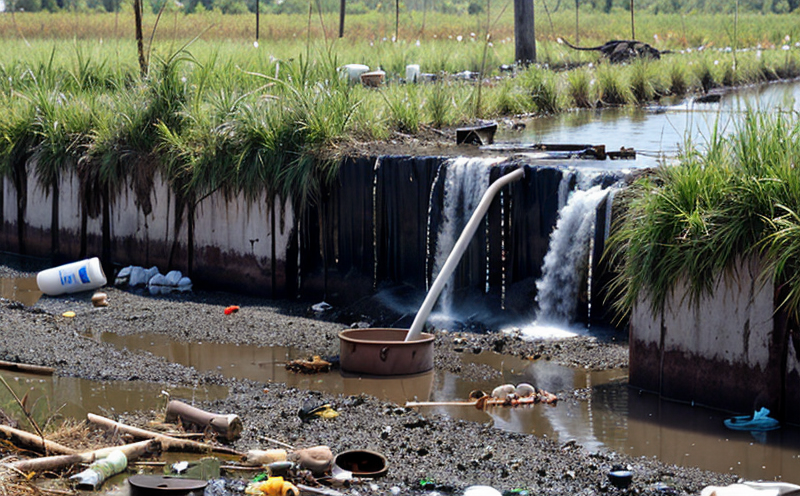Fruit Pollutant Testing
The testing of fruits for pollutants is a critical process in ensuring food safety and quality. As part of our comprehensive environmental pollutant testing services, we specialize in assessing the presence of contaminants such as pesticides, heavy metals, and other harmful substances in fruit products. This service plays a vital role in compliance with international standards and regulatory requirements.
Our approach to fruit pollutant testing involves several key steps, which ensure that every sample is handled with precision and accuracy. The first step is the proper collection of the fruit samples, ensuring they are representative of the batch or shipment being tested. Once collected, these samples undergo a rigorous preparation process that includes washing, slicing, and drying, depending on the type of pollutant being sought.
The testing itself involves several methods tailored to the specific pollutants in question. For pesticides, we use gas chromatography-mass spectrometry (GC-MS) for identification and quantification. Heavy metals are detected through atomic absorption spectroscopy (AAS). These methodologies provide precise results that can be relied upon for decision-making.
The importance of this testing cannot be overstated, especially in light of increasing consumer awareness and regulatory scrutiny. Pollutants like pesticides can have adverse effects on human health if consumed in excess. Heavy metals, such as lead or mercury, are toxic and can accumulate over time, leading to severe health issues. By offering these tests, we help ensure the safety of the food supply chain.
Our laboratory adheres strictly to international standards, including ISO 17025 for quality management systems in testing laboratories. This ensures that our results are accurate, reliable, and internationally recognized. We also comply with specific sectoral regulations such as EU Regulation (EC) No 396/2005 on maximum residue levels of pesticides.
The demand for this service is driven by a variety of factors. Consumers increasingly seek information about the origin and quality of their food, leading to a rise in demand for organic and pesticide-free products. Regulatory bodies also enforce stringent standards to protect public health. Additionally, retailers and manufacturers must ensure their products meet these high standards.
Our service is designed not only to meet regulatory requirements but also to help our clients stay ahead of the curve by anticipating future trends in food safety. By providing accurate and timely results, we assist them in maintaining a competitive edge in the market. Our team of experts ensures that every test is conducted with the highest level of care and precision.
With fruit being a staple in many diets around the world, ensuring its purity from pollutants is essential. Our testing services play a crucial role in this regard, providing peace of mind to consumers and stakeholders alike. By leveraging advanced technology and adhering to strict protocols, we ensure that every test result is reliable and actionable.
Why It Matters
The importance of fruit pollutant testing cannot be overstated in the context of food safety and quality control. Pollutants such as pesticides, heavy metals, and other harmful substances can have severe health implications if ingested. This section will delve into the reasons why this testing is crucial for various stakeholders.
- Consumer Health: Pollutants in fruits can lead to acute or chronic health issues, including neurotoxicity, cancer risks, and developmental disorders.
- Market Trust: Ensuring that fruits meet stringent quality standards builds trust with consumers and enhances brand reputation.
- Regulatory Compliance: Adherence to international regulations such as EU Regulation (EC) No 396/2005 is mandatory for importers, exporters, and manufacturers of fruit products.
In addition to these points, compliance with food safety standards can also reduce the risk of legal actions and recalls. By implementing robust testing protocols, businesses can mitigate potential liabilities and maintain a strong market presence.
Benefits
- Promotes Consumer Confidence: Ensures fruits are safe to consume, enhancing trust between consumers and producers.
- Enhances Product Quality: Eliminates the risk of contaminated products entering the market, thereby maintaining high standards.
- Saves Time and Money: Early detection of pollutants can prevent costly recalls and reputational damage.
- Achieves Regulatory Compliance: Ensures that all products meet international regulatory requirements, avoiding potential legal issues.
In summary, fruit pollutant testing offers a multitude of advantages. From enhancing consumer trust to saving time and money, it is an indispensable service in the food safety industry. By choosing our comprehensive testing services, clients can ensure their products are safe, compliant, and of high quality.
International Acceptance and Recognition
The importance of international acceptance and recognition cannot be overstated for fruit pollutant testing. In a globalized market, the standards set by various countries must align to ensure that products can travel freely across borders without encountering barriers due to differing regulations.
We are proud to adhere strictly to international standards such as ISO 17025, which ensures our laboratory is equipped with the latest technology and best practices. This compliance guarantees that our results are universally accepted by regulatory bodies around the world. Our testing protocols also align closely with EU Regulation (EC) No 396/2005 on maximum residue levels of pesticides.
The international acceptance of our services extends to various sectors, including importers and exporters, food manufacturers, and retailers. By meeting these standards, we ensure that our clients can confidently present their products in markets across the globe. This not only facilitates trade but also enhances brand reputation and customer satisfaction.
Our commitment to international recognition is further demonstrated by our participation in various accreditation programs and memberships with recognized bodies. These affiliations underscore our dedication to maintaining high standards of quality and accuracy in all our testing services.





